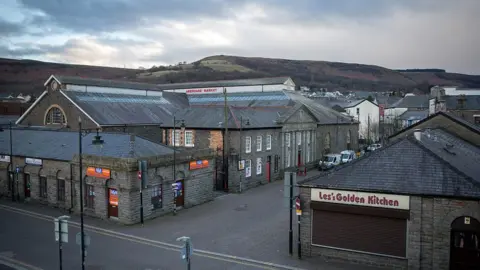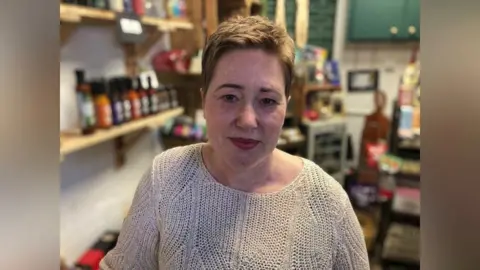High streets: Council leader wants tax on out of town stores
 Getty Images
Getty ImagesShops based out of towns should be charged higher rates, with the cash used to reinvigorate struggling high streets, a council leader has said.
Andrew Morgan's comments come after new figures showed one in six shops in Wales stood empty during the first three months of this year.
A body representing retailers said it would mean "extra cost and complexity" for businesses.
The Welsh government said it would "look at rebalancing the system".
"There's a question to be asked again of whether or not out-of-town businesses should pay a higher level of rates or whether there's some sort of levy on their car parks that generates some further income," Mr Morgan told the Politics Wales programme.
"And that funding then should be maybe ring-fenced to support town centres."
Mr Morgan, who leads Rhondda Cynon Taf council said the money would amount to "chicken feed" for big supermarket chains, but the cash could help boost high streets.
The money could be used for things such as improving public transport to get people into towns, cheaper or free parking, making high streets more accessible or improving their appearance, for example.
According to a new report by the Welsh Retail Consortium, 16.5% of Welsh shops were empty during the first quarter of 2023.
This compares with 16.3% in the final quarter of 2022, and 15.9% in the first three months of 2020, before the pandemic struck.
Only the north east of England had a higher rate of empty retail units during the first quarter of 2023.
"These figures underline the torpid recovery in the Welsh shop vacancy rate. The level of unoccupied retail premises nudged up in the first quarter of this year and remains stuck above pre-pandemic times," said the head of the Welsh Retail Consortium, Sara Jones.
"Several factors are holding back retailers and other firms from taking on empty stores, including the costs crunch and lower shopper footfall due to the shift towards hybrid working and online purchasing."

The challenges facing retail businesses are not limited to the high street, with retail parks also seeing a rise in empty units.
At 10.7%, however, their vacancy rate remains far lower than in town centres.
Aberdare in Rhondda Cynon Taf is just one example of a Welsh town where empty shop windows, locked shutters and To Let signs are commonplace.
Here, business owners say out of town retailers are partly to blame for the challenges facing the town.
"Aberdare has a particular problem with out-of-town shops," according to the owner of Bradley's Coffee Shop in the town centre, Jim Bradley.
"But that's because they've got free car parks and they can shop undercover, whereas in Aberdare the car parks cost money and that puts people off."

Amanda Webber, who runs three businesses in Aberdare Market, said: "Everyone is using the supermarkets now, so those little niche shops - the greengrocers, your fruit and veg, your butchers - have declined, and that used to be what the high street was. We need to get that back."
The local council said it has taken steps to support its town centres, which include giving businesses extra financial support and reducing car parking charges.
Responding to Mr Morgan's suggestion of an extra charge on out of town businesses , a spokesman for the Welsh Retail Consortium said: "This sounds like a charter for extra cost and complexity, on a sector which is already grappling with a cost of doing business crisis whilst striving to keep down prices for shoppers".
Launching a Welsh government plan to boost town centres earlier this week, Climate Minister Julie James - who is also responsible for regeneration - said: "We want towns across Wales to be the beating heart of Welsh communities, where people can access services, shops, communal and cultural space.
"Regenerating our town centres is complex and will only happen if we have a joint understanding of the issues they face. These include the increase in out-of-town development reliant on private car transport, the growth in online shopping, and the withdrawal of essential services.
"Our Transforming Towns programme is designed to help reverse this decline, with £100m over the next three years to reinvent towns across Wales."
Responding to Mr Morgan's suggestion, Ms James told Politics Wales: "I think we're going to have to look at rebalancing the system."
